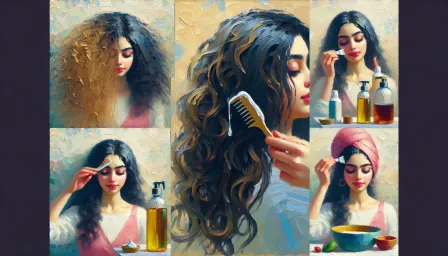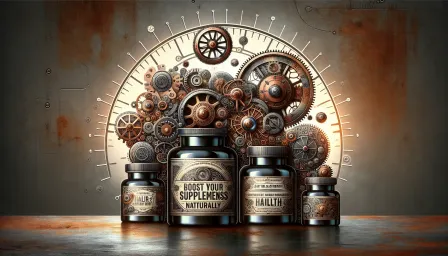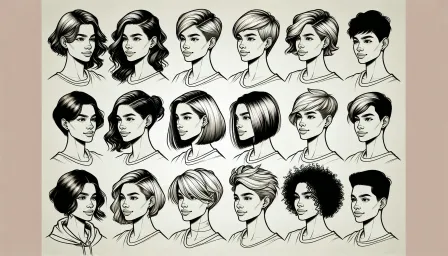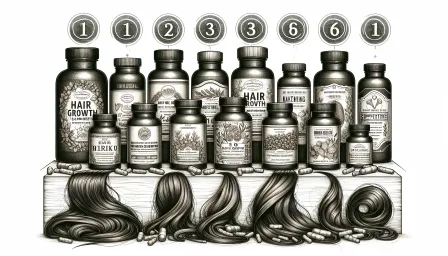Top Hair Growth Vitamins and Minerals to Achieve Luscious Locks

Discover the top hair growth vitamins and minerals essential for luscious locks. Learn how to nourish your hair from within for stronger, healthier, and more vibrant hair.
When it comes to achieving healthy, vibrant, and luscious locks, the importance of hair growth vitamins and minerals cannot be overstated. Our hair, like any other part of the body, requires essential nutrients to grow and stay healthy. In this article, we will delve into the key vitamins and minerals that are instrumental in promoting hair growth and how you can incorporate them into your daily routine for optimal hair health.
Introduction to Hair Growth Nutrients
Healthy hair growth hinges on a combination of various factors including genetics, hormones, and nutrition. While we can't control genetics, we can certainly enhance our nutritional intake to support hair growth. Specific vitamins and minerals are vital in nourishing hair follicles, preventing hair loss, and improving overall hair quality. Let’s explore these key nutrients further.
Essential Vitamins for Hair Growth
1. Vitamin A
Vitamin A is crucial for the growth of all cells, including hair cells. It also helps skin glands in producing sebum, an oily substance that moisturizes the scalp and keeps hair healthy. However, excessive vitamin A can lead to hair loss, so it's important to maintain a balanced intake.
Sources: Carrots, sweet potatoes, spinach, and kale.
2. B-Vitamins (Biotin)
Biotin (Vitamin B7) is perhaps the most well-known vitamin for hair growth. It supports keratin production, which fortifies hair structure. Other B-vitamins improve red blood cell production, aiding in the transport of oxygen and nutrients to the scalp and hair follicles.
Sources: Eggs, nuts, whole grains, and avocados.
3. Vitamin C
Vitamin C is an antioxidant that protects against oxidative stress caused by free radicals. It helps the body absorb iron, a mineral necessary for hair growth, and aids in the production of collagen, a protein vital for hair strength and structure.
Sources: Citrus fruits, strawberries, bell peppers, and broccoli.
4. Vitamin D
Vitamin D plays a significant role in the creation of new hair follicles. Low levels of vitamin D are linked to alopecia, a condition of hair loss. Spending time in sunlight can boost your vitamin D levels naturally.
Sources: Fatty fish, cod liver oil, fortified foods, and sunlight.
5. Vitamin E
Similar to vitamin C, vitamin E is an antioxidant that can prevent oxidative stress. It improves scalp circulation, thereby supporting hair growth.
Sources: Sunflower seeds, almonds, spinach, and avocados.
Vital Minerals for Hair Growth
1. Iron
Iron deficiency is a common cause of hair loss, especially in women. Iron helps red blood cells carry oxygen to cells, including those that contribute to hair growth. A lack of iron can disrupt this process.
Sources: Red meat, lentils, spinach, and chickpeas.
2. Zinc
Zinc plays a critical role in hair tissue growth and repair. It also keeps the oil glands around hair follicles functioning properly. A zinc deficiency can lead to hair loss and other scalp issues.
Sources: Oysters, beef, pumpkin seeds, and lentils.
3. Magnesium
Magnesium helps with protein synthesis, which is crucial for hair growth. Deficiency in magnesium can lead to hair thinning and shedding.
Sources: Nuts, seeds, avocado, and dark leafy greens.
4. Selenium
Selenium is important for the production of selenoproteins, which regulate inflammation and support overall immune function. These proteins also encourage a healthy scalp and hair growth.
Sources: Brazil nuts, sunflower seeds, fish, and eggs.
Integrating Hair Growth Nutrients into Your Diet
It’s essential to consume a balanced diet rich in the vitamins and minerals mentioned above for optimal hair health. Here are some practical tips:
Balanced Diet
Focus on a diverse diet that includes a variety of fruits, vegetables, lean proteins, and whole grains to ensure you get a broad spectrum of nutrients. Consider consulting a nutritionist to tailor a diet plan to your specific needs.
Supplements
If you're not getting enough nutrients from your diet alone, supplements can be a helpful addition. Make sure to consult with a healthcare provider to choose the right supplements for your needs and to avoid potential overdoses.
Hydration
Water is crucial for overall health, including hair health. Ensure you stay hydrated to maintain a healthy scalp and promote hair growth.
Additional Tips for Healthy Hair
Nutrients are invaluable, but other lifestyle practices can also support hair health. Here are some additional tips:
Regular Scalp Massage
Scalp massages increase blood flow to hair follicles, which can promote hair growth. Consider using essential oils like rosemary or peppermint during massages for an added boost.
Avoiding Heat Damage
Minimize the use of heat styling tools like hair dryers, straighteners, and curlers. Heat can weaken hair strands, leading to breakage and loss.
Gentle Hair Care Practices
Use a gentle shampoo and conditioner suited for your hair type. Avoid excessive brushing or harsh chemicals that can damage hair and impede growth.
Conclusion
Understanding the role of hair growth vitamins and minerals can empower you to take control of your hair health. By integrating nutrient-rich foods into your diet, considering supplements where necessary, and maintaining good hair care practices, you can achieve luscious, vibrant locks. Always consult with healthcare providers before making significant changes to your diet or supplementation to ensure it aligns with your individual health needs.



























